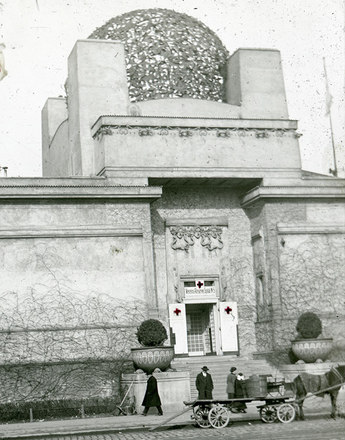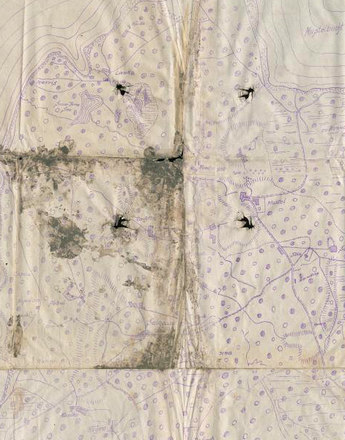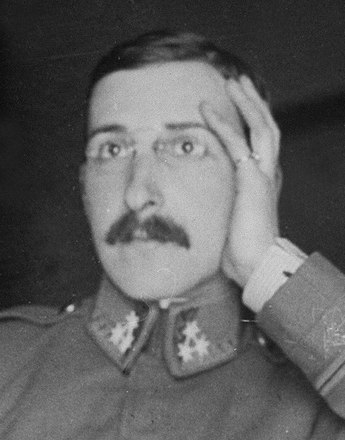‘What remained was a mutilated trunk that bled from every vein.’ Stefan Zweig and his "World of Yesterday"
Die Welt von Gestern (The World of Yesterday) (1942) is a testament, a description of Old Europe, interwoven with the author’s reminiscences – which tend towards idealization.
Zweig, like many other writers, volunteered for military service as soon as the war began, but he was found unfit for the front and was sent to the Imperial and Royal War Archive in Vienna. This was where a whole group of writers were gathered; their task was to write war propaganda – undoubtedly a privileged position, for which the authors had their profession to thank.
Zweig’s initial enthusiasm for the war, which he no longer describes in this way in The World of Yesterday (‘I had sworn to myself … never to write a single word that countenanced war or disparaged another nation.’) was first expressed publicly in the Vienna daily Neue Freie Presse in August 1914 in Ein Wort von Deutschland (A Word from Germany):
Germany must now strike with both fists, to the right and to the left, in order to free itself from the double embrace of its opponents. Every muscle of the magnificent might of her people is tensed to the utmost; every nerve of their will is quivering with courage and confidence.
In 1915 Zweig travelled to the devastated Polish war zone in order to collect material for the Archive following the Austro-German attack which had broken through the Russian front line. The reality of the war that he experienced there and elsewhere, together with the influence of Romain Rolland, a French pacifist who consistently maintained his position from the outset, led Zweig to decide ‘to commence my personal war in the midst of war, the struggle against the betrayal of Reason by the current mass passion’.
However, Zweig did not renounce his activities in the field of war propaganda definitively and consistently until 1917. He applied for leave for a lecture tour of Switzerland, where he remained as an exile until the end of the war. Zweig viewed the radical changes of the year 1918 in an ambivalent way; he returned to an Austria ‘which showed faintly on the map of Europe as the vague, grey and inert shadow of the former Imperial monarchy. The Czechs, Poles, Italians and Slovenes had snatched away their countries; what remained was a mutilated trunk that bled from every vein.’
A few months after completing his memoirs, Stefan Zweig, together with his wife, committed suicide in exile in Brazil. The way he was categorized by the literary critics was not without ambiguity, and his touched up picture of himself was not corrected until relatively late. The contradictions in his Wortkämpfe eines Pazifisten (Word Battles of a Pacifist) only became clear with the publication of Zweig’s letters in 1998, and this in a way that truly came as a revelation.
Translation: Leigh Bailey
Weinzierl, Ulrich: Außerordentlich gelehrige Halbaffen. Wortkämpfe eines Pazifisten: Stefan Zweigs Briefe 1914 bis 1919. Unter: http://www.faz.net/aktuell/feuilleton/buecher/rezension-sachbuch-aussero... (19.06.2014)
Zweig, Stefan: Ein Wort von Deutschland, in: Die Neue freie Presse vom 6.8.1914, 2f. Unter: http://anno.onb.ac.at/cgi-content/anno?aid=nfp&datum=19140806&zoom=33 (19.06.2014)
Zweig, Stefan: Die Welt von Gestern. Unter: http://gutenberg.spiegel.de/buch/6858/1 (19.06.2014)
Zitate:
„I had sworn to myself ...", „to commence my personal war ...", „which showed faintly ...": Zweig, Stefan: Die Welt von Gestern. Unter: http://gutenberg.spiegel.de/buch/6858/1 (19.06.2014) (Translation)
„Germany must now strike ...": Zweig, Stefan: Ein Wort von Deutschland, in: Die Neue freie Presse vom 6.8.1914, 2f. Unter: http://anno.onb.ac.at/cgi-content/anno?aid=nfp&datum=19140806&zoom=33 (19.06.2014) (Translation)
-
Chapters
- ‘Rabble of words’ – Writers in the War
- ‘An area to which only those who are (un)employed there have access.’
- The war after the war – reflection, homecoming and review
- ‘ … with deadly weapons, the golden plains’: Grodek as the legacy of the poet Georg Trakl
- ‘Guilt is always beyond doubt!’ Franz Kafka’s 'In der Strafkolonie' (In the Penal Colony)
- I did not want it: Die letzten Tage der Menschheit (The Last Days of Mankind)
- Anti-war literature as a bestseller: Im Westen nichts Neues (All Quiet on the Western Front)
- ‘What remained was a mutilated trunk that bled from every vein.’ Stefan Zweig and his "World of Yesterday"




